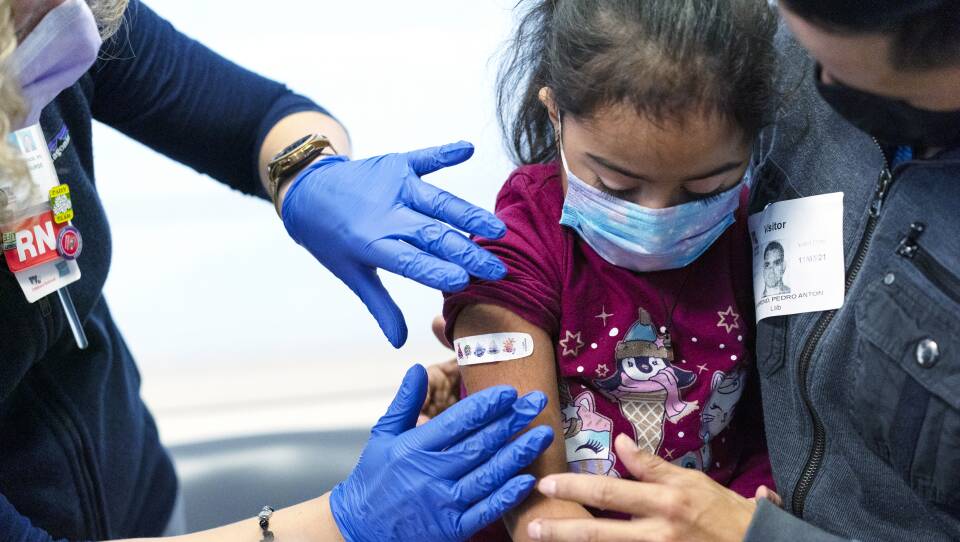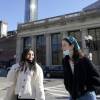Labor Day marks the unofficial end of summer — which means, if you listen closely, you can hear a collective groan from students everywhere. And with back-to-school season, the last few years have brought a new tradition: figuring out how COVID safety will work in the new year.
Sadly, that's still the case: COVID-19 cases are once again on the rise, and the CDC is reporting hospital admissions are up almost 20%. It’s a trend worrying parents as their children return to the classroom, and safety guidelines aren't as clear as they could be.
Dr. Bisola Ojikutu, physician and executive director of the Boston Public Health Commission, joined GBH’s All Things Considered host Arun Rath to help navigate the start of the school year.
Arun Rath: So I think it's safe to say most of us know at least one person right now who has COVID. It seems like like it's very much back around, but could you put this into perspective for us? I mean, we thought this was maybe going to be a different fall from previous ones. How worried should we be for a surge as our kids are going back to school?
Bisola Ojikutu: So, unfortunately, as is the case throughout the country, we have noted an increase in COVID-19 cases and hospitalizations here in Boston , and the concentration of COVID-19 virus in our wastewater samples has also trended upwards.
What I would say is that these increases are not a cause for immediate worry. However, I think they're an important reminder that COVID-19 is still around and can, for some people, still cause severe illness, particularly for those who are older or have underlying co-morbidities, who are immunocompromised, who are unvaccinated. I think that we all need to remain aware and take some precautions, particularly as children return to school and cold and flu season is right around the corner.
Rath: Let’s talk a bit about the kind of precautions we should take.
Ojikutu: In general, we make three recommendations that I think are important for parents to pay attention to.
Number one, everybody needs to get vaccinated. Vaccination works to prevent severe illness and hospitalization, and that applies to COVID-19, but it also applies to the flu. So we want people to get their annual flu shot this year as well as every year. We also want to ensure that children are up to date regarding vaccination against other infectious diseases like measles, mumps, rubella, and certainly varicella — or, chickenpox.
Going back to the flu, though, I think we really need to be clear that our goal is to get everybody — or as many people as possible, ages six months or older — vaccinated against the flu. That should happen at some point during September or early October. For families, this means planning ahead and scheduling flu shot appointments with their trusted health care providers or at a local pharmacy. So that's number one. Get vaccinated.
Number two, keeping children at home when they're sick with symptoms like fever, like worsening cough, even sore throat. As a parent, I know this is a tough one. We want our school environments to be as safe as possible for children, teachers, staff, as well as their respective households, which may include higher-risk individuals.
And then number three, we want people to continue to test. Now, our testing numbers overall for COVID-19 have dropped off considerably, but this is a reminder that testing for COVID-19 is really important if your child is sick or has been exposed. In addition, having your child take a rapid test before returning to school is also a good idea. It protects others from potential infection.
And just in general, for all folks, you know, we do recommend testing before events, particularly if you're going to be around grandparents or other older individuals who might have a higher risk of severe illness from COVID-19.
Rath: Talk about that, because I think we’re back into the swing now of having kids hang out with grandparents and other people who might be more susceptible or immunocompromised. I’m imagining that something that we need to be especially more conscious of as kids go back to school.
Ojikutu: Absolutely, because kids are being exposed. It's not to say they weren't exposed before: many kids were in summer camp, where they spent time indoors and in air conditioning. So this is something that's a constant, it's just part of living with COVID.
What we're hoping is that people will continue to be aware and think about this and think about exposure and think about the fact that elderly individuals are more likely to be hospitalized with severe illness from COVID-19, and certainly, others can still get more severe illness. We just need to be aware and take precautions.
One, don't go if you're sick, if your child has symptoms. Like I said, a fever or cough, or just not feeling well. But also utilizing testing as a resource, I think, is really critical. And it's because testing is so critical, and because the numbers have dropped off in terms of testing, that we're really pushing this recommendation.
I think it's very problematic that test kits over the counter are costly and out of reach for many, so the Boston Public Health Commission has really gone out of our way to create a network of distribution hubs where residents can easily access free at-home rapid testing kits.
We've established at least one of these hubs in every single Boston neighborhood, and we have a full list of distribution sites as well as the hours of operation on our website. It's really unique here in Boston that we've kept standing sites available. Standing sites are places where people can get access to boosters, to rapid antigen at-home testing kits and advice in regards to COVID-19.
So we have two of these that are still open and available, one at the Bolling Building in Roxbury and another at City Hall. Because people are going back to school, for this week, we've actually expanded the hours of operation at the Bolling Building site : it’s open from Tuesday all the way through Saturday from 12 to 6.
Please, everyone stop by. We will have boosters available, rapid antigen at-home testing kits available, as well as folks who can answer questions.
Rath: Last fall, we had this triple threat with COVID, the flu and RSV. In terms of RSV, how much of a concern is that as we get into the fall?
Ojikutu: It is a major concern. RSV, or respiratory syncytial virus, can cause very typical cold symptoms that are difficult to distinguish between other causes with similar symptoms. It is a leading cause of hospitalization in infants, and it's one of the main drivers of mortality in infants.
In addition, if you think about older adults at risk — individuals who are over age 60 with underlying medical conditions — they can suffer very severe illness and hospitalization due to RSV. So this is something we're very concerned about as we enter into the season in which we do see an increased number of cases.
Last year, we certainly did see high levels of hospitalization due to RSV, as well as due to influenza and COVID-19, so the good news this year is that there are new vaccination options and new vaccines available for people who are over the age of 60 years of age . These vaccines in clinical trials have efficacy in the prevention of lower respiratory tract diseases, a more severe illness, that's relatively high — around 80%. So, certainly, this is something that individuals who are older should talk about with their health care provider.
There is an option for infants: Monoclonal antibody therapy, which also reduces the risk of lower respiratory tract disease significantly in infants who have not been exposed to RSV. These monoclonal antibodies are recommended for all infants up to eight months or born during or entering this first RSV season.
Pregnant women can also be vaccinated against respiratory syncytial virus, or RSV, which can protect their infants if those infants are born during a season where we have a higher risk of RSV.








